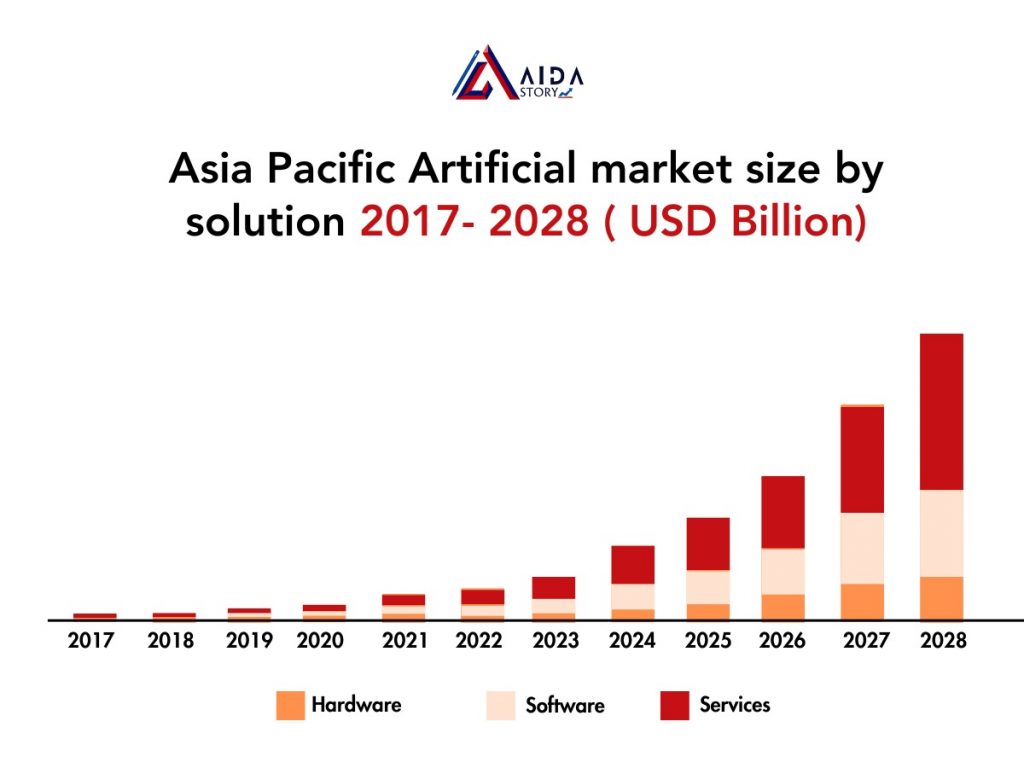
The marketing landscape is constantly evolving, and in 2024, artificial intelligence (AI) is taking center stage. In fact Sean Downey, Google’s President, Americas and Global Partners, believes it will be the single biggest trend in 2024. This suggests that AI is no longer a futuristic concept. It is rapidly transforming the way brands connect with consumers, offering unparalleled opportunities for personalization, efficiency, and growth.
Understanding the Power of AI
AI refers to the development of intelligent systems that can mimic human cognitive functions like learning and problem-solving.
In the marketing universe, AI uses vast amounts of data to automate tasks, make data-driven decisions, and personalize customer experiences.
According to a Forbes report, the global AI market is expected to reach a staggering $1.8 trillion by 2030, highlighting its significant impact across various industries, including marketing.
Image reference : https://www.forbes.com/advisor/in/business/ai-statistics/
Image Source : (Forbes)
7 ways AI is Empowering Marketers in 2024:
- Hyper-Personalization:
73% of Consumers today crave unique and relevant brand interactions. AI excels at analyzing customer data (purchase history, demographics, browsing behavior) to create highly personalized experiences. This can translate into targeted advertising, personalized product recommendations, and dynamic content tailored to individual preferences. AI empowers marketers to cater to this growing demand (the market is due to reach $12 billion by 2025) fostering stronger customer relationships and boosting conversions.
- Content Creation at Scale:
Generating high-quality content consistently can be a challenge for marketers. AI steps in as a valuable content creation assistant. From generating product descriptions and social media posts to creating personalized email campaigns. AI can automate repetitive tasks, freeing up valuable time and resources for marketers to focus on critical tasks. Additionally, AI can analyze customer sentiment and preferences to inform content strategy, ensuring content resonates with the target audience.
- Smarter Ad Targeting and Optimization:
Reaching the right audience with the right message at the right time is crucial for successful advertising campaigns. AI excels at this by analyzing vast amounts of data to identify ideal audience segments and optimize ad targeting. This not only ensures ads reach the most relevant individuals but also minimizes wasted ad spend.
- Predictive Analytics for Informed Decisions:
Making data-driven decisions is essential for successful marketing strategies. AI-powered predictive analytics empowers marketers to forecast future customer behavior, market trends, and campaign performance. This allows for proactive decision-making, enabling marketers to tailor campaigns, allocate resources effectively, and anticipate potential challenges.
5. Enhanced Customer Service and Chatbots:
Providing exceptional customer service is vital for building brand loyalty. AI-powered chatbots can offer 24/7 customer support, answer frequently asked questions, and resolve simple issues, reducing the burden on human agents. In fact, 63% of retailers are already using generative AI to enhance their current customer service offerings (source : capgemini)
6. Real-Time Market Research and Competitor Analysis:
Staying informed about market trends and competitor activities is crucial for staying ahead in the game. AI can analyze vast amounts of online data from social media, news articles, and industry reports to provide real-time insights into market trends, competitor strategies, and customer sentiment. This empowers marketers to adapt their strategies quickly, identify new opportunities, and gain a competitive edge.
7. Utilizing the Power of Creativity:
While AI excels at data analysis and automation, its capabilities are expanding to encompass creative endeavors. AI can generate creative content formats like ad copy, product descriptions, and even video scripts, sparking new ideas and assisting human creatives in the brainstorming process. This allows marketers to explore innovative approaches to content creation and experiment with different formats to engage audiences effectively.
The Future of AI in Marketing
As AI technology continues its rapid evolution, its impact on the marketing landscape will become even more transformative. Here’s a closer look at some of the exciting advancements we can expect in the coming years:
1. Personalized Recommendation Engines:
AI-powered recommendation engines are already adept at suggesting relevant products and services to individual customers. However, the future holds even greater potential. Imagine AI that not only considers past purchases and browsing behavior but also factors in real-time emotions, contextual cues, and even weather conditions. This level of personalization could revolutionize the shopping experience, leading to a 25% increase in customer satisfaction and loyalty.
2. Sentiment Analysis for Real-Time Campaign Adjustments:
AI can already analyze social media conversations and online reviews to gauge customer sentiment. In the future, this capability will become even more sophisticated, enabling real-time adjustments to marketing campaigns based on sentiment shifts. Imagine a brand being able to identify and address negative sentiment towards a new product launch within minutes, potentially mitigating reputational damage and improving campaign effectiveness.
3. AI-powered Creative Generation:
While AI-assisted content creation is already gaining traction, the future holds the promise of AI that can not only generate content but also understand the nuances of human emotions and cultural contexts. This could lead to the creation of highly engaging and culturally relevant marketing materials that resonate deeply with target audiences across diverse demographics.
4. Integration with VR and AR:
The rise of virtual reality (VR) and augmented reality (AR) technologies opens up exciting possibilities for immersive marketing experiences. AI will play a crucial role in integrating these technologies seamlessly, allowing brands to create interactive and personalized experiences that go beyond traditional marketing channels. Imagine customers trying on clothes virtually or experiencing product demonstrations in an AR environment, all powered by AI.
5. Ethical Considerations and Transparency:
As AI capabilities continue to expand, ethical considerations and transparency will become paramount. Marketers need to ensure that AI-powered solutions are used responsibly, avoiding bias and discrimination in decision-making. Additionally, transparency in how AI is used to personalize experiences and target customers will be crucial for building trust and maintaining customer relationships.

Conclusion: AI Marketing
While AI holds immense potential to transform marketing, it’s important to remember that it is not a replacement for human creativity and strategic thinking. The future of marketing lies in a collaboration between humans and AI. Marketers can use the power of AI to gain deeper insights, automate repetitive tasks, and personalize experiences at scale, while retaining control over the overall strategy and ensuring ethical implementation. By embracing AI and continuously learning about its potential, marketers can unlock new possibilities for success, forge stronger connections with customers, and navigate the ever-evolving digital landscape with greater confidence.
Want to reach the full potential of your online presence?
Invest in exceptional content, amplified reach, and a brand that resonates like never before. Contact AIDA Story today to craft a thriving online identity for your brand. Let’s cultivate growth, together.

